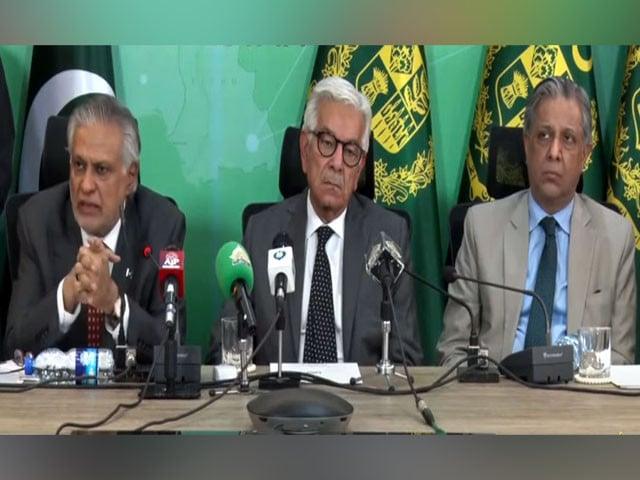Dar-foreign minister and Minister of Foreign Affairs, ISHAQ DAR on Thursday warned that Islamabad could withdraw from the Simla agreement and other bilateral treaties if India unilaterally reveals the industrial waters, in the midst of increasing diplomatic tensions.
During a joint press conference with higher members of the cabinet, he said: “If India puts an end to the Industry Water Treaty, Pakistan will plan to remove the Simla and other agreements agreement. We do not need external help to respond to the assault, India will receive an adapted response. ”
Dar rejected the Indian allegations of cross -border terrorism as “baseless blame games”, urging India to present evidence if it has them.
He said Pakistan had identified the arrival of “foreign nationals” in Srinagar who are under surveillance by intelligence agencies. He allegedly alleged that Indian intelligence supported these people, who would have tried to pass improvised explosive devices (IED).
“You can imagine their planned destination,” said Dar, stressing that the armed forces of Pakistan are fully ready to counter any threat.
He also confirmed the immediate closure of the Wagah border and announced that Indian Islamabad staff would be reduced to 30 by April 30. In addition, the defense, the air and the naval attachés of India were declared no one non -grata and sentenced to Pakistan.
Citing the reference of former American president Bill Clinton to Indian terrorism, Dar highlighted the history of the regional aggression of India. He also canceled his next visits to Bangladesh and Kabul to face the situation of course.
“India cannot stop water for 240 million Pakistanis,” said Dar. “If he tries to do so, he will be treated as an act of war.” He added that Pakistan is prepared for any scenario and informs the World Bank, a guarantor of the Industry Water Treaty, of the actions of India.
On border tensions, Dar warned against the interpretation of minor violations as well as security failures, given the 2,000 -kilometer section. He reiterated Pakistan’s commitment to prevent the use of his territory for cross -border operations.
“If India attacks, we will answer in kind,” said Dar, adding that if Pakistan is ready to consult its allies, it does not need external help to defend itself. “If someone is trying an adventure, the consequences could be worse than before.”
He noted that the formal approach of India to the Pakistani envoy did not mention the suspension of the industrial water treaty, despite the declarations of the Indian cabinet suggesting the opposite. “It seems that there may be disconnection between the Indian government and its Ministry of Foreign Affairs,” said Dar.
The press briefing followed a meeting of the National Committee of Pakistan (NSC), where civil and military leaders approved a range of countermeasures that it described as an “aggressive unilateralism”.
As part of the measures, Pakistan announced the closure of its airspace to Indian commercial flights and ordered the expulsion of Indian defense, air and naval attachés. The Indian High Commissioner of Islamabad will see its staff reduced to 30 members, from April 30.
Pakistan has also closed the Wagah border and published 48 -hour departure notices to the country’s Indian nationals, with the exception of Sikhs pilgrims, whose trips are not affected.
Meanwhile, the Minister of Defense, Khawaja Asif, accused India of carrying out “false flag operations” repeatedly to justify allegations against Pakistan, citing the recent incident in Pahalgam as another example.
“Despite the attempts of the Indian media to involve Pakistan, the Indian government did not officially appoint us as part of the Pahalgam attack,” as a joint press conference on Thursday with senior government officials.
Giving a blow on Indian Prime Minister Narendra Modi, Asif said: “To date, no American administration has never prohibited a Prime Minister of entry by calling him a terrorist. Modi is a certified terrorist who supervised the massacre of the Muslims of Gujarat when he was Minister -Chief. “
The Minister of Defense also asked how such an attack could occur under the supervision of the Indian security forces in highly militarized cashmere. “The incident raises serious questions about the effectiveness of the Indian forces,” he said.
He established a parallel with the 2019 Pulwama incident, suggesting that he was also staged. “India has a history of orchestration of attacks to replace Pakistan,” he said, adding: “Despite our political differences to the country, the nation is united against Indian aggression.”
The Minister of Information, Attaullah Tarar, criticized India’s rhetoric as a “juvenile posture” and warned that the prohibition of airspace would have a financially impact on Indian airlines. “It’s more than talking, we have taken measures,” said Tarar.
An official of the Pakistan Water Treaty Commission noted that the Treaty could not be suspended unilaterally. “Even for two wars, the treaty endured. It remains in force unless the two nations dissolve it jointly,” said the official.
Pakistan has informed the World Bank, which is a guarantor of the treaty, and envisages additional diplomatic avenues if India is suspended.




